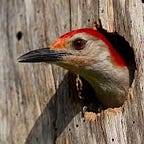My solutions for the “Command Line challenge”
Recently,I stumbled upon this really cool website https://cmdchallenge.com/ which poses a really cool challenge to write single line bash commands for the tasks given there.It really made me rethink about the amount of knowledge I have on bash commands.I got stuck at many stages and couldn’t find any elegant solution online.(All the stackoverflow solutions available for this are kind of messy :P )So I thought it would be cool to write the solutions myself.So hope it helps!!But I strongly recommend you to try the challenge yourself and refer these solutions only if your banging your head on the desk in frustration!
Solution #1 Print “Hello World”.
Ans: echo hello\ worldSolution #2 Print the current working directory.
Ans: pwdSolution #3 List names of all the files in the current directory,one file per line.
Ans: lsSolution #4 There is a file named “access.log” in the current directory. Print the contents.
Ans: cat access.logSolution #5 Print the last 5 lines of “access.log”.
Ans: tail -5 access.logSolution #6 There is a file named “access.log” in the current working directory. Print all lines in this file that contains the string “GET”.
Ans: grep ‘GET’ ./access.logSolution #7 How many lines contain tab characters in the file named “file-with-tabs.txt” in the current directory.
Ans: grep -c $’\t’ ./file-with-tabs.txtSolution #8 Print all files in the current directory, one per line (not the path, just the filename) that contain the string “500”.
Ans: grep -l ‘500’ *Solution #9 Print the relative file paths, one path per line for all filenames that start with “access.log” in the current directory.
Ans: find . -name "access.log*"Solution #10 Search for strings in files recursive
Ans: grep -r -h ‘500’ — include ‘access.log*’Solution #11 Extract all IP addreses from files that start with “access.log” printing one IP address per line.
Ans: grep -r -h -o ‘[0–9]*\.[0–9]*\.[0–9]*\.[0–9]*’--include ‘access.log*’Solution #12 Delete all of the files in this challenge directory including all subdirectories and their contents.
Ans: find . -deletePS:Eventhough the above solution works perfectly at first I tried “rm -rf *” but it didn’t work and I couldn’t find an explanation for it.So if you know the reason why this won’t work feel free to comment below and let me know.Thanks!
Solution #13 Count the number of files in the current working directory. Print the number of files as a single integer.
Ans: ls | wc -lSolution #14 Print the contents of access.log sorted.
Ans: cat access.log|sortSolution #15 Print the number of lines n access.log that contain the string “GET”.
Ans: grep -c ‘GET’ ./access.logSolution #16 The file split-me.txt contains a list of numbers separated by a ‘;’ character.Split the numbers on the ‘;’ character,one number per line.
Ans: cat ./split-me.txt | sed s/\;/\\n/gSolution #17 Print the numbers 1 to 100 separated by spaces.
Ans: echo {1..100}Solution #18 There are some files in this directory that start with a dash in the filename.Remove those files.
Ans: find . -name ‘-[a-z]*’ -deleteSolution #19 There are files in this challenge with different file extensions. Remove all files with the .doc extension recursively in the current working directory.
Ans: find . -name ‘*.doc’ -deleteSolution #20 There are files in this challenge with different file extensions. Remove all files without the .txt and .exe extensions recursively in the current working directory.
Ans: find . -type f -not \( -name ‘*.txt’ -or -name ‘*.exe’ \) -deleteSolution #21 This challenge has text files (with a .txt extension) that contain the phrase “challenges are difficult”. Delete this phrase recursively from all text files.Note that some files are in subdirectories so you will need to search for them.
Ans: find . -name “*.txt” -exec sed -i ‘s/challenges are difficult//g’ {} +Solution #22 The file sum-me.txt has a list of numbers,one per line. Print the sum of these numbers.
Ans: awk ‘{s+=$1} END {print s}’ sum-me.txtSolution #23 Print all files in the current directory recursively without the leading directory path.
Ans: find . -type f -printf "%f\n"Solution #24 Rename all files removing the extension from them in the current directory recursively.
Ans:find `pwd` -type f -exec bash -c 'mv "$1" "${1%.*}"' - '{}' \;Solution #25 The files in this challenge contain spaces.List all of the files (filenames only) in the current directory but replace all spaces with a ‘.’ character.
Ans:find . -type f -printf "%f\n" | xargs -0 -I {} echo {} | tr ' ' '.'Solution #26 here are a mix of files in this directory that start with letters and numbers. Print the filenames (just the filenames) of all files that start with a number recursively in the current directory.
Ans: find . -type f -name ‘[0–9]*’ -printf ‘%f\n’Solution #27 Print the 25th line of the file faces.txt
Ans: sed ‘25q;d’ faces.txtSolution #28 Print the file faces.txt, but only print the first instance of each duplicate line, even if the duplicates don’t appear next to each other.Note that order matters so don’t sort the lines before removing duplicates.
Ans: awk ‘!c[$0]++’ faces.txtSolution #29 The file however has been corrupted, there are random ‘!’ marks inserted throughout. Print the original text.
Ans: < war_and_peace.txt tr -s ‘!’ | sed ‘s/!\([a-z]\)/\1/g’ | sed ‘s/!\( [a-z]\)/\1/g’ | sed ‘s/!\.!/./g’ | sed ‘s/ !/ /g’Solution #30 access.log.1 and access.log.2 are http server logs. Print the IP addresses common to both files, one per line.
Ans: comm -12 <(cut -d’ ‘ -f1 access.log.1 | sort) <(cut -d’ ‘ -f1 access.log.2 | sort)And there you go!If you had any other interesting or cool solutions for these challenges please let me know in the comments below. Feel free to follow me for security related stuff.Happy bashing!
